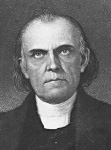Love to God implies cordial approbation of his moral character. His natural attributes, eternity, immensity, omnipotence, etc., may fill us with admiration; but these are not the proper objects of love. If we worship Him in the beauty of holiness, the beauty of His holiness must excite the love of our hearts. As our knowledge of these moral perfections increases, our delight in them must increase; and this delight will stimulate to further study of them; and to a more diligent observation of the various methods in which they are manifested. The display of them, even in the most terrible exhibitions of His justice, will be contemplated with reverent, but approving awe; and their united glory, as seen in the great scheme of redemption by Christ, will be viewed with unmixed and never-ceasing delight.
Love to God includes joy in His happiness. He is not only perfectly holy, but perfectly happy; and it is our duty to rejoice in His happiness. In loving our neighbor, we rejoice in his present happiness, and desire to increase it. We cannot increase the already perfect happiness of God, but we can rejoice in that which He possesses. If we delight in the happiness of God, we shall labor to please Him in all things, to do whatever He commands, and to advance all the plans, the accomplishment of which He has so much at heart. Love, therefore, includes obedience to His commands, and resignation and submission to His will.
Love to God will render it a pleasing task to examine the proofs of His existence, and to study those glorious attributes which render Him the worthy object of supreme affection. Let us enter on this study, prompted by holy love, and a strong desire that our love may be increased.

